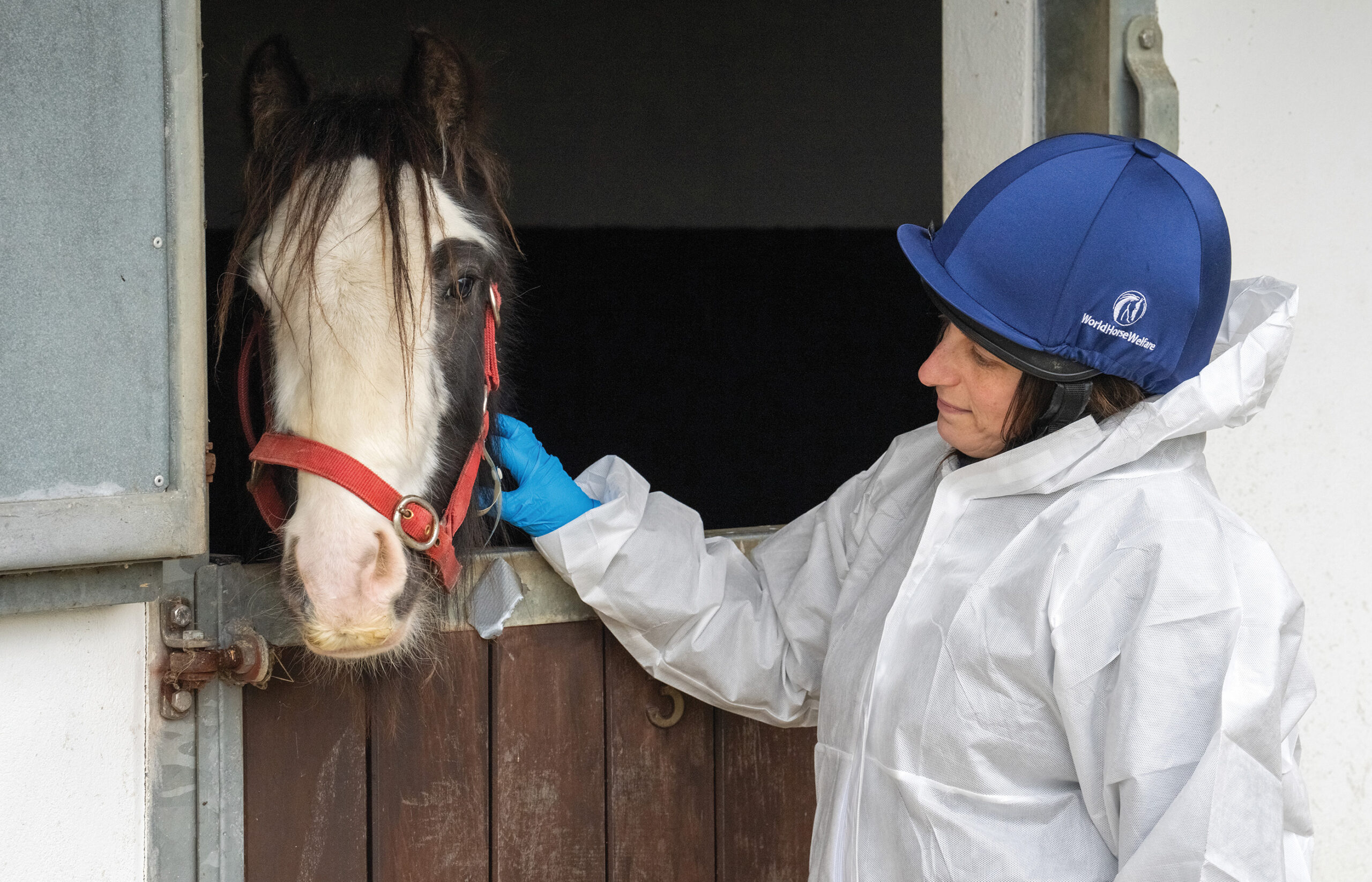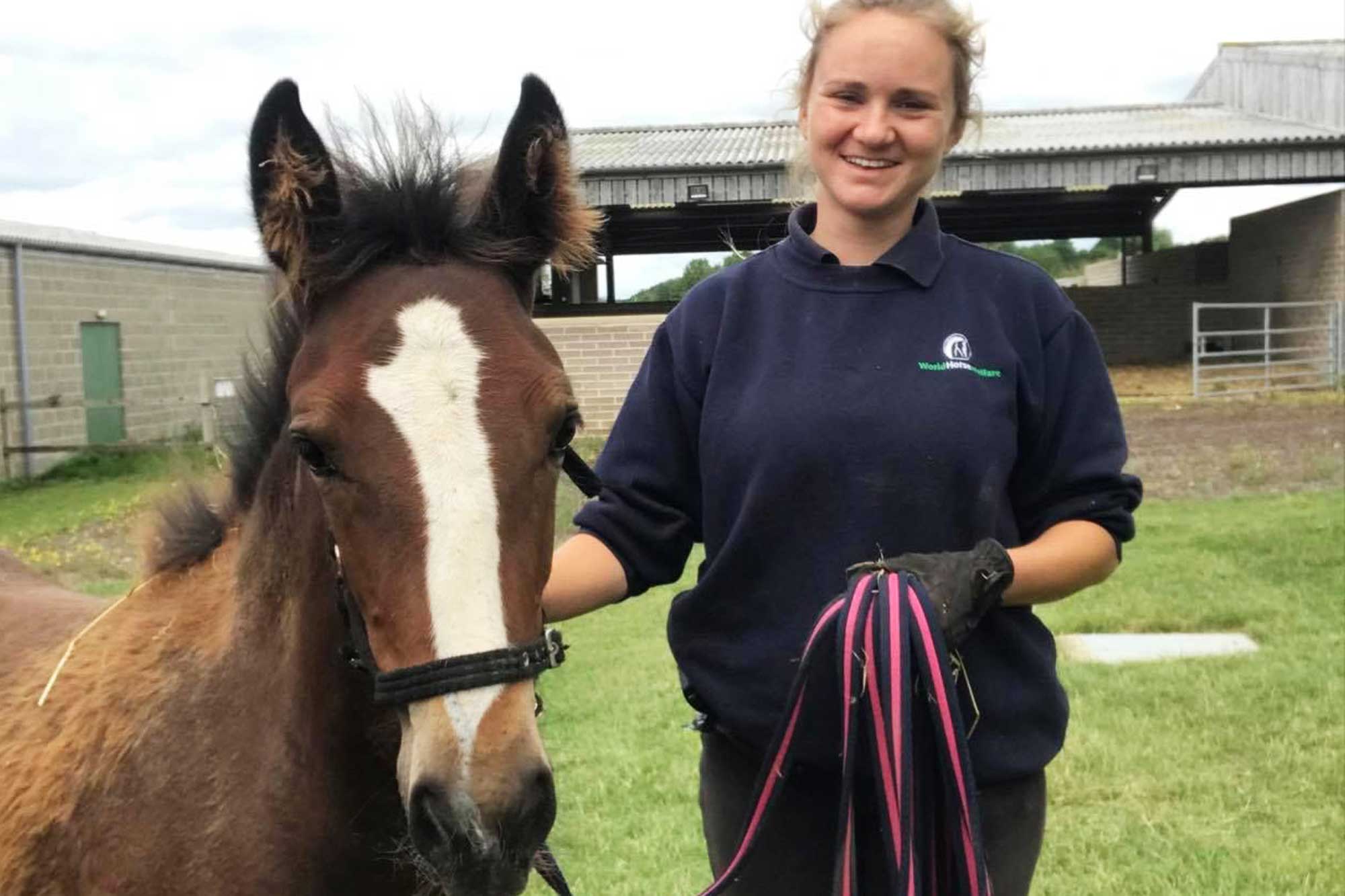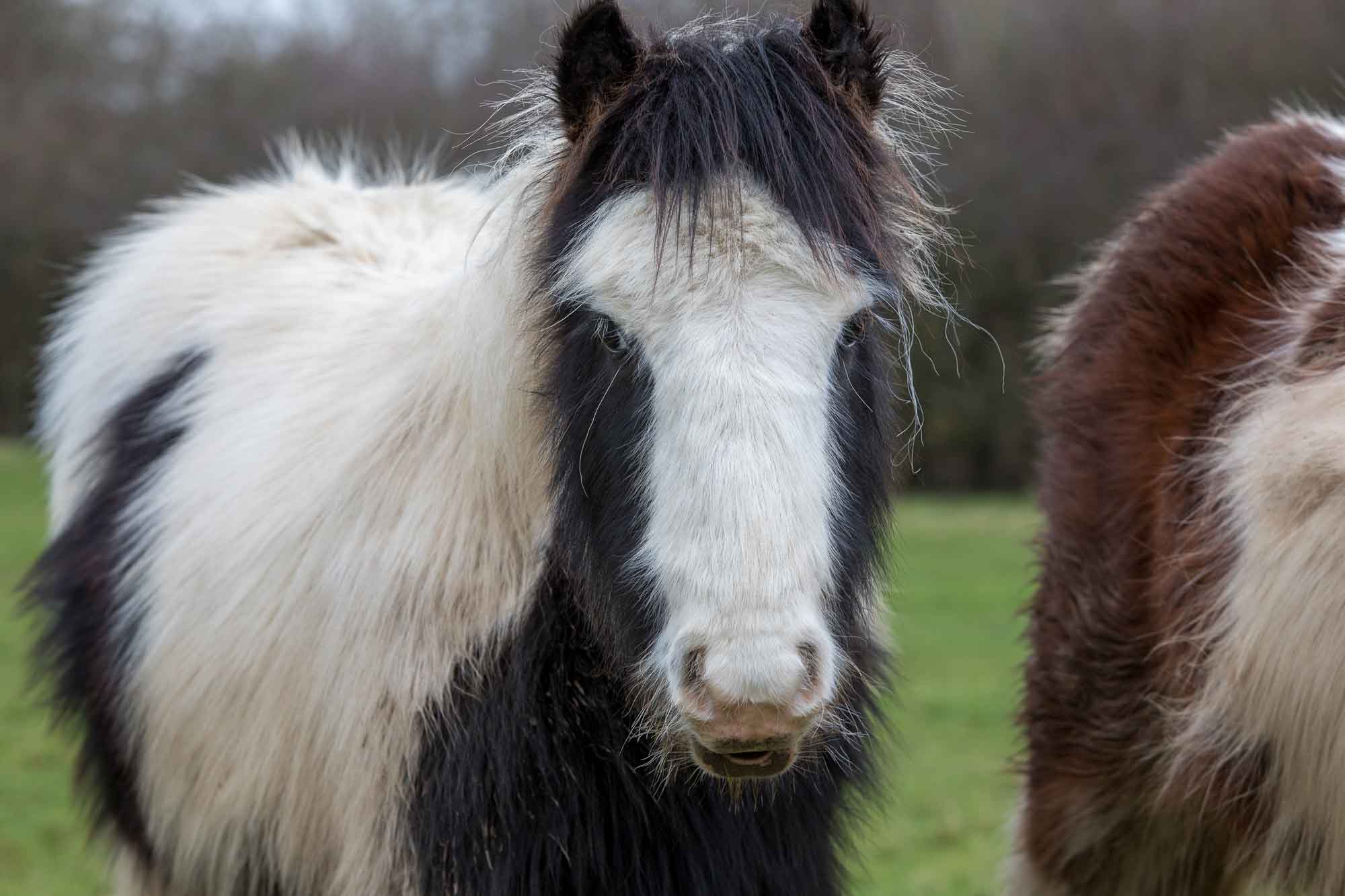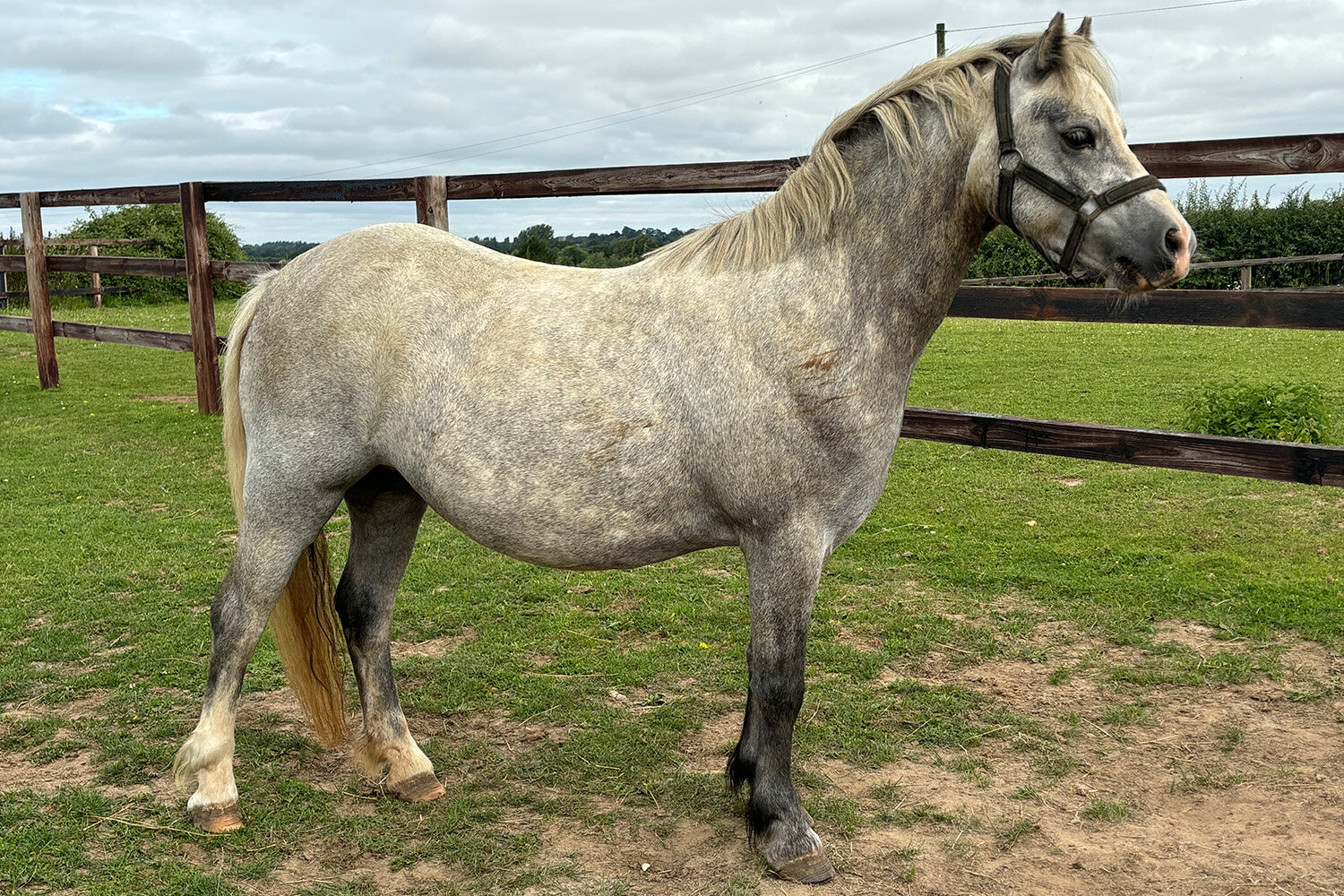Our Head of Public Affairs brings us up to date with what we currently know about the horses rescued from illegal smuggling.
Posted on 14/02/2025

A year after we rescued 26 horses from being illegally transported out of the UK, we’ve stepped in to help another group of horses on the brink of being trafficked to an unknown fate. We’ve named this group the Trafficked 20.
Eight of the horses, including a pregnant mare, a pony battling a severe skin infection, three foals, two Irish thoroughbreds and a riding pony, have now come to the safety of our Hall Farm Rescue and Rehoming Centre.
We caught up with Kim Ayling, our Head of Public Affairs, to find out what we know about the Trafficked 20 so far.
Where have the Trafficked 20 horses come from?
The declared journey for this consignment of horses began in Northern Ireland and was discovered at Dover port, heading for mainland Europe.
We are currently trying to trace where the horses originally came from, but from the information we have now, it seems that two of the horses in our care were from Northern Ireland, and the rest from the Republic of Ireland. Unlike last year’s group, the Dover 26, where most of the horses originated from markets, we don’t believe that is the case for the Trafficked 20. Our current understanding is that seven of the horses were being moved legitimately and these could have provided a cover for those being moved illegally.
How were the Trafficked 20 discovered?
Officials at Dover Port were initially alerted by the smell coming from the transporter, which indicated there was a full load of animals onboard. Whilst this smell isn’t particularly unusual for a large consignment of horses being transported a long distance, they decided it was worth taking a visual inspection of the vehicle, upon which they discovered one of the foals was down and unable to get back up.
Are welfare checks carried out on every shipment of horses at British ports?
No, they are not. There is no requirement for shipments of horses being imported to or exported from Great Britain to be physically checked, although movements from Great Britain to Northern Ireland should be subject to more robust checks to then allow them free movement to Southern Ireland. There are checks on the EU side, if the consignment is declared as coming from Great Britain.
In this instance it was deemed an internal EU movement transiting through Great Britain, so there would have been less rigorous checks when they entered via Calais. In addition, inspectors are not present 24/7 at ports and smugglers know how to avoid them by travelling at times when enforcement is weakest.
This is why we are campaigning for intelligence led checks, alongside spot checks, on entry and exit from all UK ports and a digitalised equine identification system in the UK and EU, to ensure every horse can be traced. We want to ensure that legitimate movements are not subject to long delays, which can also hugely impact horse welfare, while enabling measures to be targeted at smugglers who exploit the system and put horses at risk.
Were all of the horses being smuggled or trafficked?
All 20 horses that were discovered at Dover were on an illegal transport, but we do not know that all of them were being smuggled and what their fate might have been. The transport was illegal as we believe that some of the horses were being exported for slaughter and fattening – which is in contravention of the ban on live exports to slaughter and fattening – and failed to comply with The Welfare of Animals (Transport) Order 2006.
Of the 20 horses on the consignment, we were informed that seven of the horses were claimed by their owners. The remaining 13 horses were effectively abandoned.
Are these horses checked against the stolen horses register?
We currently have no reason to believe that any of these horses were stolen. We check the national equine databases where they are public facing – which in the UK is the Central Equine Database – with the chip companies and also with the Passport Issuing Organisation (PIO).
If a horse is stolen then the PIO should be notified and, in the UK, the Central Equine Database can be updated directly via Digital Stable, which we urge all horse owners to do. This is also why it is critical that horse owners keep their details up to date with their horse’s PIO, so if they are stolen it is easier to trace their owner. However, we also know that the current paper-based system is flawed, with horses even travelling on a passport that was issued to a different horse, and we also see horses with more than one microchip – or none. In these cases, we try to trace the history of the horse through a variety of methods.
How are sick and emaciated horses still profitable to export illegally?
Even sick or emaciated horses can still be profitable. Smugglers cut costs by cramming horses onto overloaded vehicles and skipping feed and water. They also hide their journeys to evade taxes and use incomplete or fraudulent paperwork to avoid complying with biosecurity requirements and the costs associated with them.
The horses themselves may also hide the true purpose of the journey. If they don’t sell for riding or breeding, some still end up going for fattening and slaughter where traders make a final profit—no matter how poor the horse’s condition.
Can the traders be prosecuted?
Unfortunately, those behind this case and others like it are unlikely to be prosecuted because the patchwork of laws and accountabilities to enforce them make this difficult. The current equine identification system simply does not work and, unlike livestock, horses are not traceable. This makes it extremely challenging to identify these movements and, when they are found, to find the person(s) who should be prosecuted. Regulatory action has been taken by APHA against transporters like this, but they have not been prosecuted. We’re pushing for stronger laws, better traceability, and proper enforcement to stop this cruelty.
How does this still happen now that we have banned export for slaughter with the Animal Welfare (Livestock Exports) Act 2024?
Although it is great that the Animal Welfare (Livestock Exports) Act now makes it illegal to export horses from Great Britain for fattening and slaughter, for this legislation to protect horses like the Trafficked 20 and the Dover 26, then secondary legislation and the right level of enforcement need to be in place to disrupt the trade. We are currently working with the UK Government to ensure these measures are as robust as possible but they need to be supported by a fully digitalised equine ID and traceability system if these vulnerable horses are to be fully protected.
We will be campaigning in the EU and UK for a fully digitalised equine ID system to ensure every individual equine is traceable to protect horses from suffering at the hands of smugglers.
What do we know about the eight horses that have come into our care?
The eight horses include a pregnant mare, a pony battling a severe skin infection, three foals, two Irish thoroughbreds and a riding pony.
This is an ongoing investigation so our current knowledge is limited and may be subject to change. We have passports for all the horses that came to us but at this stage we do not know the legitimacy of the documentation – as we know, paper-based passports are open to fraud. One of the horses has two microchips and one of the horses doesn’t appear to have any.
Why will it cost £56,000 to ensure these eight horses get the care they so desperately need?
As we rescue and rehome more horses each year than any other charity in the UK, rehabilitating and finding new homes for approximately 300 horses is increasingly resource-intensive. The challenging economic climate continues to put pressure on the need for our services and, coupled with this, we have seen the costs of caring for our horses rise – rocketing from an average of £5,000 to over £7,000 per year to nurse each horse from the moment of rescue through to rehoming.
The figure of £56,000 takes this into account for the eight horses now in our care. This is a conservative figure as one of the horses is a pregnant mare and we haven’t factored in that cost yet. Moreover, the case has brought strangles onto our farm requiring us to temporarily cease rehoming.
The rising costs won’t stop us helping horses in need, but we can only do that with the help of our supporters and our rehomers.
Is there anything people can do to lobby authorities or raise awareness of this?
Yes you can help by raising awareness and pushing for change. We are currently encouraging everyone who cares about horses to write to their MP to raise awareness of this this horrific trade. Actions like this, and signing petitions, can make a real difference in urging the government to improve enforcement and introduce a fully digital equine ID system.
If you keep an eye on our socials or, if you have not done so already, sign up to hear from us via emails, as we have a number of campaigns planned for this year.
Anyone based in the UK can take part in our current action today.
Anyone based in Europe can sign our petition now.
As ever, we will continue to keep you updated on the progress of the Trafficked 20 and about our work to protect the welfare of all horses, ponies, foals and donkeys, regardless of their role in society.
If you would like to help us today with a donation to the Trafficked 20 appeal, please visit our donation page. Whatever you can afford to give promises to change a life.
Read the full news story about the Trafficked 20 which includes a video about their rescue.
Topics
Related Blog Posts

Buena’s story – how our foals are cared for from birth to rehoming
Senior Groom Steph introduces lovely filly Buena and explains how the team care for foals from birth right through to finding them a loving home for youngster handling.

Behind the scenes: the first few months as a World Horse Field Officer
Find out what really goes on behind the scenes as a World Horse Welfare Field Officer.
Recommended News Articles

Horses rescued from being cruelly smuggled abroad are ready for rehoming
Five 'Dover 26' mares are now looking for homes where they can thrive.

Equine experts share insights in new video series that puts the horse front and centre
Eight-part, free to view series focuses on the advice horses would want their owners to take

Waltham Chase woman banned from keeping horses
RSPCA and World Horse Welfare alerted after concerns were raised for three equines kept at a stable yard.
Enjoy reading stories like this?
Join over 65,000 other horse lovers and sign up for our email newsletter

Join over 65,000 other horse lovers and sign up for our email newsletter
Sign me up now